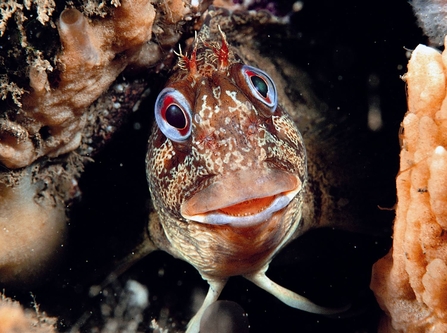
Tompot Blenny. Image by Paul Naylor.

Tompot Blenny. Image by Paul Naylor.
In this region, a leading conservation charity is calling for the risks to wildlife around UK shores to be addressed.
Mike Pratt, Northumberland Wildlife Trust Chief Executive says:
“From ancient sea creatures to new species for science, the discoveries in this year’s marine review show just how spectacular life is below the waves.
“While full of surprises, our oceans are also busy places where wildlife is facing a huge range of pressures - including climate change, pollution and development.
“Protecting large areas of our oceans is crucial for fishing and other industries that rely on healthy seas, as well as providing security for important carbon storing habitats like seagrass meadows and seabed sediments.”
Research, monitoring and advances in technology have enabled scientists to uncover a wealth of new information about marine life. Exciting discoveries show how much there is still to learn about UK seas and why legal protections are vital for wildlife and climate.
A 100-year-old Greenland shark washed up at Newlyn in Cornwall - the second ever UK stranding of this species and let’s not forget the flurry of excitement caused by Thor the walrus who travelled from the Hampshire coast via Scarborough to Blyth harbour for an overnight stay at new year before heading north towards the arctic.
Avian flu, oil leaks, plastics in sea birds and disturbances, ramp up pressure on marine life.
Wildlife in UK seas faces multiple threats from pollution, overfishing, development, and climate change with wildlife having to cope with:
Research suggests the event may have been caused by industrial pollutants from dredging in the River Tees. The incident underlines the need to investigate how industrial activity can affect marine life.
The UK will become the first nation to produce a complete map of its blue carbon stores. The Blue Carbon Mapping project - led by the Scottish Association for Marine Science (SAMS) in collaboration with The Wildlife Trusts, WWF and RSPB - have begun the task and will publish results in the summer of 2023.
Mike Pratt, Northumberland Wildlife Trust Chief Executive concludes:
“The sea needs better protections to help nature recover and thrive as a matter of urgency. That must start with the Government abandoning the dangerous Retained EU Law Bill which threatens to rip up existing laws that protect wildlife and wild places both on land and at sea.”